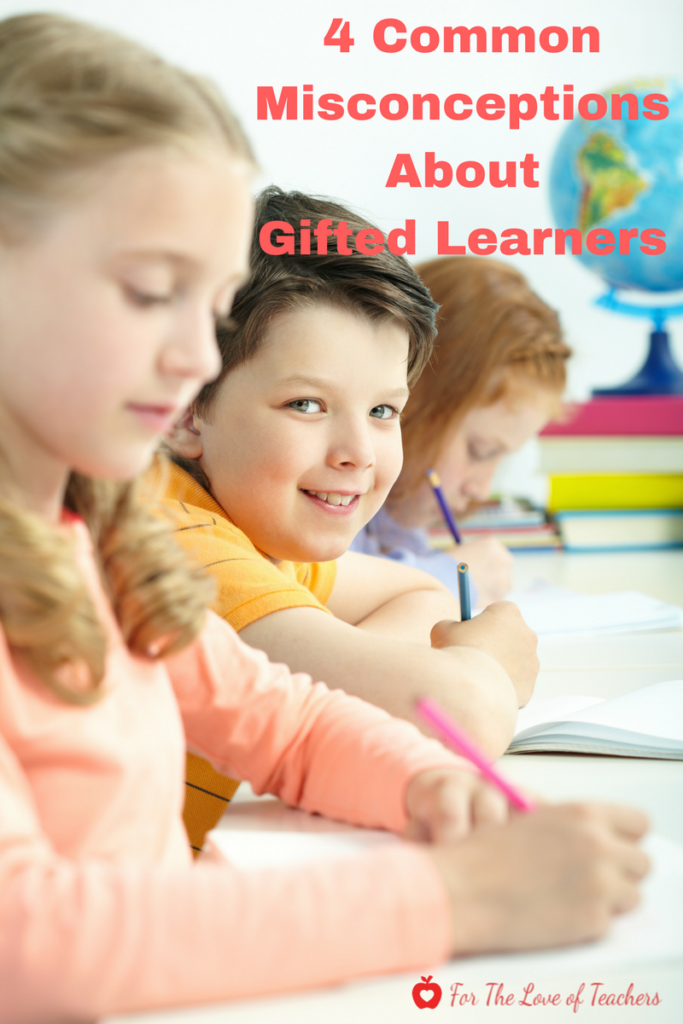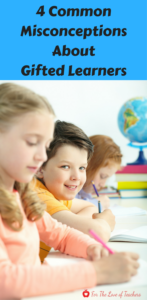I have been a proud educator of elementary Gifted & Talented students for the past 12 years in a self-contained classroom. I didn’t seek out the opportunity to teach gifted education, I just fell into it and was intrigued by specializing in this area early in my career. I have worked with all kinds of gifted learners from perfectionists to underachievers to twice exceptional students. Like all special education teachers, I learned how to modify, accommodate and differentiate my instruction to meet the needs of my students. I continually sought out opportunities to grow professionally to build my knowledge and expertise. However, throughout my career, it struck a chord with me when I was faced with misconceptions about gifted learners from teachers, parents and students.
Misconceptions
1. The Teachers –“Oh, You Teach Gifted, You Have The Easy, Well Behaved Students.”
Teaching gifted learners is no easy task. Teachers outside of gifted education think you are teaching a homogenous group of high achievers, when in fact, a classroom of gifted learners is a heterogeneous group of diverse learners, many of which are low achievers. There are also many challenges from disruptive behaviors to social emotional issues. I have taught extremely social and chatty students, impulsive students, frustrated students, perfectionists, procrastinators, and students who struggle socially and emotionally. The social emotional level of a gifted learner is not always at the same level as the learner’s intellectual level. This poses some challenges for the learner both socially and emotionally. Being a Responsive Classroom teacher and implementing the strategies to support social and emotional learners has been extremely helpful and I highly recommend it to all teachers. Teachers of gifted learners also teach twice exceptional students, students who are gifted, but also may have another disability that interferes with learning, like Autism, Asperger’s, ADD and ADHD. So the misconception that all gifted students are easy to teach or are well behaved is false.
Tips: Challenge the teacher that says, oh you have the good class” or “teaching gifted in like taking a walk in the park” by offering to work with them. Work alongside colleagues that teach regular education to discuss classroom management tips and teaching strategies that work with all learners. Having these discussions brings awareness that the issues they are facing in their classroom regarding student behavior, classroom management and student achievement are alike in a gifted classroom. Comparing the two as “different’ is pretty senseless. It’s quite similar actually.
2. Parents- “Why Doesn’t My Child Have Perfect Grades? They Are Gifted, Right?!”
Many parents of gifted children come to parent teacher conferences concerned about why their child isn’t getting perfect test scores and isn’t at the “top” of the class. They question the teacher’s qualifications, expertise and differentiation and may challenge the teacher in everything they do. This could be very trying for the teacher. Most gifted learners do not have a perfect report card or do not necessarily ace every test. Many highly gifted learners are underachievers and have poor grades. Look at Albert Einstein, he was a genius but was not a good student. Gifted learners, when not stimulated or engaged in new learning, tend to get bored which results in low achievement and low grades. Furthermore, this can lead to poor self-esteem, anxiety, fear of failure and even depression. Unfortunately, children do not come with a handbook and raising children is hard enough in itself. Parents of gifted children have an even more challenging job of not only understanding their child, but understanding the unique characteristic of their gifted child as a learner. Teachers of gifted learners serve a bridge in helping parents of gifted learners in understanding their child as a student. Teachers can help parents of the gifted child understand that the misconception that all gifted learners are high achievers is false.
Tips: Reassure parents that teachers of gifted education are highly qualified in teaching gifted learners and will support their child in any way they can. Gently educating and guiding parents to some of these helpful resources is a great way to support families with gifted children.
3. Other Kids- “You Are In “Gifted?” “You Are A NERD.”
Gifted learners tend to feel isolated because they are labeled as a “nerd” or “geek” from others. This stereotypical label is a common misconception. Most gifted learners know they are different from their peers. I have seen firsthand “other kids” bully gifted learners on the playground or in the hallway, saying demeaning comments like, “you are weird” or “you are a geek,” lowering the gifted child’s self-worth causing them to withdraw from social situations. The misconception, or stereotype, that gifted learners are “nerds” is false.
Tips: Integrate regular education and gifted education students in any way you can, like grade level projects and field trips. Integrate, not segregate. In fact, throw out the term or label “gifted” in schools altogether. Build a school community on unity and acceptance for all learners. Educate all staff, students and parents about diversity and build a respectful learning environment for all students to reach their greatest potential. Our job as educators is to meet the needs of all students, whether in a regular education classroom, in a special education classroom, or on the same spectrum, in the gifted education classroom.
4. The Biggie: “Gifted Students Are Gifted in Everything.”
The biggest misconception among all 3 groups, teachers, parents and students, is Gifted learners are gifted in everything. Not necessarily! According to identification and characteristics check list at the NSWAGTC, (NSW Association For Gifted and Talented Students), gifted learners are characterized into 6 broad categories of giftedness:
-
general intellectual ability
-
specific academic aptitude
-
creative thinking and production
-
leadership
-
psychomotor ability
-
visual and performing arts
Some gifted learners show general intellectual ability, like being an avid reader, showing interest in a variety of areas, creative in new ideas, or resourceful in problem solving. They may learn quickly or easily with little or no repetition, have a large vocabulary or display a great curiosity about events or interests. Others show a specific academic aptitude and may have a long attention span in an area of interest. They may like to study some subjects more than others or spend time on projects of interest, extending their learning to show a broad perspective on one or more subject areas. Then there are the creative thinkers and producers. They elaborate on ideas and are flexible in their thinking patterns. They may show intense concentration on task. I was blown away when my students provided multiple solutions or responses to how to solve math problems. These creative thinkers often have a keen sense of humor. They can be silly, display lots of energy, can be disruptive and challenging at home and in the classroom.
The leaders are the ones that organize the group. They help establish the mood of the group. They listen attentively and empathetically. They articulate ideas clearly and can give directions effectively. They are your responsible and reliable students. Some students are gifted athletically. They are coordinated and balanced. They are energetic and demonstrate endurance, and have stamina and persistence in physical activities. The students gifted in the visual or performing arts show gifts and talents within music drama and art.
Having a classroom of gifted learners within these broad categories, a teacher of gifted learners pretty much differentiates in every sense of the way to engage all learners, which is extremely challenging. So the biggest misconception of all that gifted learners are gifted in everything is definitely false!
Tips: Help educate others that ALL students have gifts and talents in different areas. Some students may need services to help reach their fullest potential in those areas. Pull out gifted programs are really useful in meeting the needs of students who do not need a self-contained classroom but hone in on developing the area the child shows “giftedness” in.
Call to Action!!!
The bottom line is educating these three groups, teachers, parents and students, about common misconceptions about gifted learners. Be an advocate for gifted learners and challenge those with misconceptions. Teach others by bringing awareness about gifted education, gifted learners and teachers of gifted students. Help all groups to integrate their way of thinking that no matter the educational setting, a teacher’s job is to meet the needs of the students in which they serve. Raising awareness is powerful. It’s our job as educators to be a voice for all students.
Teach gifted learners? Have experience with facing these misconceptions? Leave comments below. Then go to Forums and go to Teaching Gifted Learners and share your experience with teaching gifted learners. Visit For The Love of Gifted and Talented Students page for helpful information and resources in gifted education. Learning from each other helps us to grow together.
Need resources? Be sure to visit the Shop for resources to support your classroom. And join For The Love of Teachers email list to receive the latest and greatest updates, plus receive monthly freebies!!
If you like it, then pin it!


Christine Weis is a passionate educator, classroom management coach, wife, and mom of two busy boys. She enjoys teaching, writing, and creating resources for teachers.






I am guilty of many of these misconceptions, especially of thinking a class full of gifted learners would be a homogenous group. Very interesting and insightful read!
Hi Clarice!
Thanks for your comment. I think many of us are guilty of thinking that a class full of gifted learners is a homogeneous group of learners. In my experience, I’ve had to differentiate just as much in a gifted ed class as in regular ed class.
Thanks for your feedback!
~Christine at For The Love of Teachers
This is a great post. It has many points I never even thought of. No matter what, teaching and parenting is hard work!
Hi! Thank you so much for your comment! You are right on…teaching and parenting is hard work. The hardest jobs out there in my opinion.
~Christine at For The Love of Teachers
Great post! It’s interesting because growing up the “gifted” students were always the ones that were taken out of class and the rest of us considered them the “disruptive” ones or the ones who maybe had a special learning disability that made them incapable of learning with the rest of us. Its interesting that as a student we considered it this way, because as an adult it’s the opposite. And of course being an educated mother of a teenager I know that it’s a very intricate selection process. Interesting how the sterotypes can be so easily dispelled with a tad bit of educations about the program!
Hi!Thank you so much for your thoughtful comment. It’s so true that the perspective of gifted education differs among people based on their own experiences. Educating others is key to working through these misconceptions.
~Christine For The Love of Teachers
This was really interesting to read! My parents are both teachers and think they would certainly agree with your points in this post. Really good read!
HI! Thank you so much for your comment. I appreciate your feedback!
~Christine at For The Love of Teachers
Great post – I think teachers (like most jobs) have a lot of behind the scenes work and issues that don’t really get seen day to day. People tend to assume gifted students are naturally “easier” but the truth is each class/student comes with it’s own struggles.
HI Shelby! Completely agree with you. It boggles my mind how others judge other people’s jobs when they may not even have a clue to what goes on behind the scenes. Good point! We all have our own challenges in every profession!
Thanks for your comments!
~Christine at For The Love of Teachers
As a teacher, I can identify with all of these. There is no such thing as “an easy class”. We all know that. Ha!
Hi! Thanks for your comment! I agree with you…definitely no such thing as an easy class. Even though I pray for one every year!;)
~Christine at For The Love of Teachers
So true! Just because they’re gifted doesn’t mean they’re well-behaved learners. I had this problem in my class ALL THE TIME.
Thanks for reading this post and for sharing your comments! I have had tough classes throughout my entire career, gifted learners or not. We teachers are tough! Ha!
~Christine at For The Love of Teachers
I love this. I have been toying with getting my authorization for teaching GATE students. Ironicallt so many people think that’s the ‘easier’ gig. Ha.
Hi Erin,
Thanks for your comment! Definitely not an easier gig! I completely agree! Always having another certification is good to have under your belt. It helps you grow professionally too!
~Christine at For The Love of Teachers
I totally agree with you, here. There are often common misconceptions people have about gifted students. Yes, they are higher-order thinkers, but they may also have attention deficits, behavior challenges, etc. I taught the gift and talented before. I loved it, but it definitely had it’s challenges! Your article is right-on!
Lori,
Thanks for your comment! We have to remember that gifted learners are children first, and all children, no matter their intellectually ability, have struggles and challenges. It’s our jobs as teachers to recognize that and to meet their needs.
~Christine at For The Love of Teachers